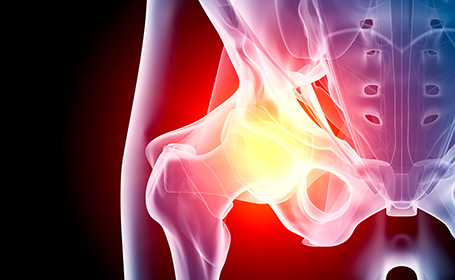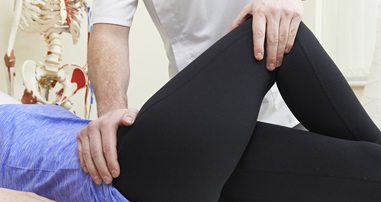
Hip pain: symptoms, causes and treatment
Find out everything you need to know about hip pain, from how to treat it yourself at home to when it’s time to seek professional help. Including expert advice and a video from Consultant orthopaedic surgeon Mr Sebastian Dawson-Bowling, a specialist in treating hip pain.
The most common causes of hip pain are injury, overuse and arthritis (in its various forms). Often hip pain can be managed or reduced with lifestyle changes such as exercise and better nutrition. However, some hip pain needs professional treatment.
This guide gives an overview of hip pain, its associated symptoms, common causes, and available treatments. We also link through to some more in-depth guides on these different topics, and share the advice of one of our experienced hip pain specialists.
Hip pain: an overview

The hip is a ball and socket joint that allows for fluid movement. It's a very durable joint but it's not infallible. Like any other joint, it can be damaged.
Our hips are two of the joints we use the most. Just going about your daily life, your hips are hard at work, absorbing the stress and strains of the day. Unsurprisingly then, hip pain is more common in older people, whose joints have been working for longer.
You might experience pain in one or both of your hip joints for a wide variety of reasons. These will generally fall under the categories of injury, overuse or arthritis. If you have damage to your joint, you may experience pain, stiffness or swelling. This might result in reduced movement in the joint.
People experience hip pain in different ways. For example, some people are woken up by hip pain at night, while others only experience pain while exercising. You might have pain in just one hip or feel it in both of them.
Family members miss the person I used to be. I don't go to events anymore. I've stopped being invited to places.
Hip pain and mental health
In a recent survey, we spoke to our respondents about the impact of hip pain and other types of joint pain on mental wellbeing.
Themes of depression, anxiety and isolation were felt throughout the survey responses, emphasising the distressing impact of joint pain on mental wellbeing. Some sufferers feel entirely dependent on family members to care for them. They are often unable to socialise with friends, stay active, or fulfil everyday activities. Life can feel like an uphill battle, with little relief.
"Family members miss the person I used to be. I don't go to events anymore. I've stopped being invited to places" - Anonymous respondent
Many respondents also fight a vicious cycle of chronic pain and little to no sleep each night. This cycle is often described as painsomnia, a term coined by members of the rheumatoid arthritis community to express the destructive and frustrating nature of chronic pain's affect on sleep over time.
"I can't sleep. I wake up constantly throughout the night in pain, which makes me unproductive during the day" - Anonymous respondent
Some respondents explain that joint pain has gravely affected their romantic relationships, creating self-confidence issues and driving a wedge between them and their partners.
"I can't go out and meet new people. I don't feel fun or sexy to be around" - Anonymous respondent
What are the common causes of hip pain?
Often hip pain is a short-term problem, caused by overuse or a small bang or overextension. Try resting your hip for a week to see if it improves.
If not, speak to your GP or a physiotherapist to get a diagnosis. The most common causes of hip pain include:
Osteoarthritis
Osteoarthritis is caused by wear and tear on your joints over time. This is the most common type of arthritis in the UK and one of the most common causes of hip pain and stiffness.
Rheumatoid arthritis (RA)
Another type of arthritis, RA is caused by an autoimmune response that mistakenly targets healthy cells. People with rheumatoid arthritis will usually have symptoms in two or more joints. As well as pain, RA is characterised by inflammation and swelling. This may come and go in what's known as 'flare ups'.
Bursitis
Bursitis happens when you damage the bursa in your hip. A bursa is a fluid-filled sac near your joint that reduces friction between bones and tendons.
Tendonitis
Tendonitis can develop when your tendons and muscles are overworked. Your tendons can become stiff and won't work as well, and you will often have pain, too.
Fracture
Hip fractures are relatively common after high impact injuries or falls. You will normally need urgent treatment at the hospital, and many people need surgery.
It is also possible to develop a small fracture without notable trauma. This might happen to athletes due to overuse, or to older people after a smaller knock or fall. Again, you may need surgery.
Osteonecrosis
Osteonecrosis, also known as avascular necrosis, is a disturbance in the blood flow to the hip. Causes include injury, long term steroid use and excessive alcohol consumption.
Impingement and hip labral tears
Hip impingement means your hip is misaligned, which can result in increased friction when you move. This can in turn damage the labrum (a rubber seal around the hip joint). Labral tears can also be caused by an accident or by overuse.
For most people, the best way to reduce or avoid hip pain is to increase their activity levels. There are very few instances where less exercise is the best response.
Other hip pain triggers and how to ease hip pain
Mr Sebastian Dawson-Bowling is a consultant orthopaedic surgeon at The London Independent Hospital. He discusses other conditions that can trigger hip pain and shares advice on how to treat hip pain.
"Arthritis is the most common cause of hip pain. This means that the coating on your joint has worn away. Other patients may experience muscular pain, nerve pain, or inflamed ligaments or tendons. Some people experience strains due to sporting injuries.
"Increasingly we're starting to understand that in some younger patients there can be impingement between the top of the thigh bone and the outside of the hip, which can cause secondary damage to the labrum. Another group of patients experience pain that feels like it's coming from the hip joint but is actually coming from the joint above (the spine) or the joint below (the knee). Other causes of hip pain can include rheumatoid arthritis, psoriasis, and even inflammatory bowel disease (IBD).
"For most people, the best way to reduce or avoid hip pain is to increase their activity levels. There are very few instances where less exercise is the best response.
"Of course, if there are particular activities or movements that repeatedly make your hip hurt, it's best to avoid them. But in general, regular exercise in the long term will improve the health and flexibility of your joint, boosting function and reducing pain."
Speak to a healthcare professional before starting a new exercise programme. They'll be able to give personalised advice on the safest and most effective approach.
When should I seek help for hip pain?
Most hip pain will be short-term and will get better on its own. Rest the joint and, if you feel you need it, use over-the-counter painkillers or anti-inflammatories while it heals.
If you're still in pain after a week's rest, if the pain is in other joints as well as your hip(s), or if you also develop a rash or fever, it's time to seek medical advice. Often hip pain, even hip pain that lasts longer than a week, can be managed by lifestyle changes. But some of the less common causes of hip pain can be very serious.
That's why it's always best to book and appointment with your GP, a physiotherapist or a specialist consultant. They'll help you identify what's wrong and, if needed, build a treatment plan tailored to you.
What treatments are available for hip pain?
The type of treatment you are recommended for your hip pain will depend on the cause as well as the severity of your symptoms. If you have an injury, for example, your consultant may well build a recovery plan for you. This will help you get back to normal as soon as possible, and could involve a mix of treatments, from physiotherapy to complementary therapies to surgery.
If your pain is due to mild osteoarthritis, you may decide that simple lifestyle changes are the best approach for now. However, if your condition is more advanced and becoming very disruptive, you may be recommended more invasive treatments, such as joint injections or surgery.

How to relieve hip pain through lifestyle changes
Certain lifestyle factors can increase the risk of hip pain. These include being overweight, smoking, having a poor diet, and not getting enough exercise.
Making small changes to improve your health will likely be the first advice you are given to try and reduce or even cure your joint pain. For example, losing weight can ease the pressure on your joints, while stopping smoking has been shown to reduce joint pain for many people.
Low impact exercises can strengthen the muscles around your hips as well as improving your flexibility. Making small changes like this can significantly reduce your pain in the long term, and even stop you from needing more invasive treatments in future.
Non-surgical treatments for hip pain
Sometimes you will need a little more than lifestyle changes to get your hip pain under control. There are various non-surgical treatments you may be prescribed.
Physiotherapy is a highly effective treatment for many people. A physiotherapist will show you exercises and stretches that could significantly improve the health of your hip joint, improving flexibility and reducing pain without doing further damage.
There are also medications that might be recommended. These include painkillers (both over the counter and prescription), anti-inflammatories and joint injections.
Surgery for hip pain
Surgery will only be recommended if you and your consultant both think it's the best choice for you. There are different types of hip surgery available. The procedure you are recommended will be based on your individual circumstances as well as the cause and severity of your joint pain.
For example, a hip labral tear may be treated with laparoscopic (keyhole) surgery. This will usually be a hip arthroscopy, which is a type of minimally invasive surgery that can be used to both diagnose and treat a wide range of hip conditions.
If you have very advanced arthritis and your pain or lack of mobility is stopping you from doing the things you love, you might be recommended hip replacement surgery. This involves removing your damaged hip joint and replacing it with a prosthesis. This is a common and very successful surgery. At Circle Health Group we perform thousands of hip replacements each year, some even using robotic technology. Hip replacement surgery can have huge benefits for a person's quality of life, but it won't be recommended unless you've tried less invasive methods and they haven't worked.
If you want to learn more about hip pain treatment or find the best option for you, call or book online today to arrange an appointment with one of our expert consultants.
Tags
How do I book an appointment?
If you're concerned about symptoms you're experiencing or require further information on this subject, talk to a GP or see an expert consultant at your local Circle Hospital.